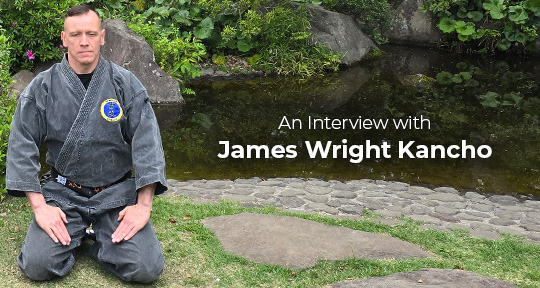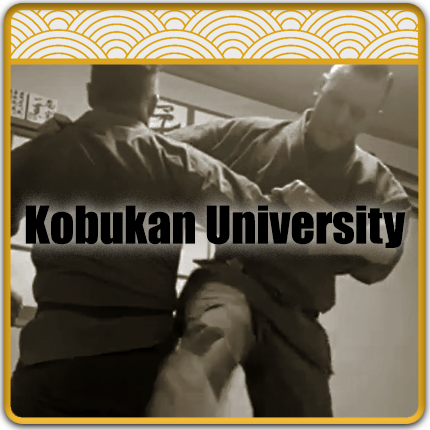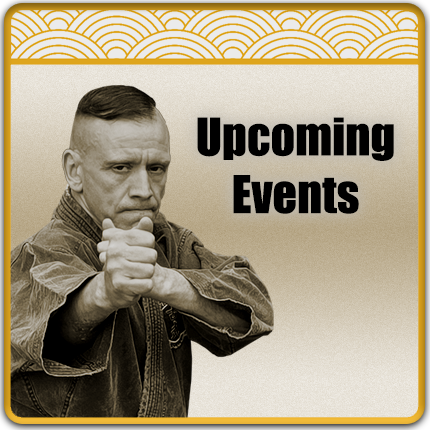Preface
For anyone deeply involved in the Kobudo community, particularly within the Takamatsu-den and Ninpo martial arts, the name James Wright is synonymous with skill, respect, and authenticity. Over the years, his reputation as a tough and serious martial artist has stood out in countless conversations I’ve had with practitioners around the world. Known for his appearances on the Discovery Channel and his impressive demonstrations of martial arts both on screen and in person, Kancho Wright is often seen as an imposing figure in the world of Ninpo.
I’ve had the privilege of witnessing his skill firsthand, occasionally even being on the receiving end of his techniques—often accompanied by a knowing smirk. Despite his prominence within the “X-kan” community, he remains a private individual who values authenticity and personal connections above public acclaim.
When I asked if he would be willing to answer a series of written questions for an interview, I wasn’t expecting such generous responses, much less ones to be shared publicly. It’s my hope that Kancho’s answers provide the same insight and inspiration to you as they have for me.
—Mark Bramble
An Interview with James Wright Kancho
1. What first inspired you to begin your journey in traditional Japanese martial arts, and how has that shaped your life?
My journey into martial arts began when I was just six years old, inspired by the James Bond movie “You Only Live Twice”. In the film, Bond travels to Japan and immerses himself in the world of ninjas. I was captivated by the discipline, skill, and mystery of martial arts. That moment sparked a passion in me. At the time, the only martial arts dojo in my area was a judo dojo at a local boys’ club. Eager to begin, I joined without hesitation and quickly fell in love with the rigorous training and the sense of camaraderie it fostered.
This early experience shaped not only my love for martial arts but also ignited a deep fascination with Japanese culture. The movie, combined with my dojo experience, planted the seed of a dream: to one day move to Japan and immerse myself in its traditions and way of life. Looking back, I realize how much those first steps in the dojo influenced the path I would follow for years to come.
2. As Kancho of the Kobukan, what do you see as your most important responsibility to your students and the martial arts community?
As the head of a martial arts organization, I believe my most important responsibility is to remain accessible and approachable to everyone who wishes to learn and grow.
It is my mission to ensure that the martial arts preserved within the Kobukan are taught in a way that highlights their timeless relevance, offering profound lessons and benefits in today’s modern world. By being open to questions, fostering a welcoming environment, and adapting our teachings to contemporary contexts, I aim to bridge the gap between ancient wisdom and present-day practice. These arts remain a source of strength, discipline, and inspiration for generations to come.
3. What do you think sets the Kobukan apart as a Takamatsu-den or X-kan organization?
What sets us apart from other organizations is our openness and the removal of the secrecy often associated with traditional schools. While we maintain the hierarchy and traditional teaching style of Japanese martial arts, we strive to create a more transparent and inclusive environment.
4. In the many conversations on martial arts I’ve had over the years, your name has come up often as someone who a lot of people respect as an authority in Takamatsu-den arts, not only from a knowledge perspective, but as someone who has used these arts in real self-defense. Is there any self-defense situation you’ve experienced that stands out to you, perhaps in a “did that really just happen” scenario?
Anyone who truly knows me knows that I am a very private person and rarely speak about my past or moments that required me to use these techniques. However, I will share one occasion.
While I was in Canada with my best friend and brother, Troy Wideman, an incident occurred that stands out in my memory. I’ll condense the story but include what was going through my mind at the time. We had just returned from training, and the house opposite Troy’s home was hosting a loud party. Troy went over to ask them to shut it down, and things escalated quickly. We found ourselves dealing with multiple known gang members.
At one point, I was holding a man on the ground—a man who had threatened to shoot Troy. I remember feeling quite annoyed with him and wanting to teach him a lesson. As I was restraining him, I suddenly heard a calm voice in my ear say, “He can’t breathe, James.” That made me pause and re-evaluate my actions.
Meanwhile, four of the man’s friends returned, armed with baseball bats, intending to help him. I had already made a mental decision about how to respond if they advanced on Troy and me. However, seeing how easily their friend was being controlled, they clearly thought twice. Just then, a SWAT team arrived, and the other gang members disappeared.
There’s much more to this story and its aftermath, but that’s something I share only with my closest students and friends. The surreal part of this experience was how calm I felt throughout. My training took over, and knowing Troy had my back made me feel secure.
5. With the popularity of modern combat sports like BJJ, MMA, and such, what value do you think koryu martial systems, such as those in the Kobukan, bring to the table from a self-defense perspective?
While modern combat sports excel in physical conditioning, grappling, striking, and sparring against resisting opponents, koryu martial arts offer a holistic, context-rich perspective that addresses aspects often overlooked in sport-based systems. Together, they can form a well-rounded self-defense skill set. However, one drawback of many koryu martial arts is their heavy reliance on kata practice, which can limit adaptability in dynamic situations.
At the Kobukan, we teach traditional kata while also demonstrating their tactical applications. Additionally, we encourage practitioners to incorporate realistic training against resisting partners, which, in my view, sets us apart from other organizations.
6. Do you have a favorite ryu-ha or series of techniques within a ryu-ha?
Yes, I do. The two schools that I really enjoy are Gyokko Ryu Kosshijutsu and Koto Ryu Koppojutsu. I feel Gyokko Ryu has a finesse, teaching you to be relaxed and graceful, while Koto Ryu has a very direct and explosive feel to it, which makes it, in my opinion, a very practical school.
7. How do you balance preserving the historical traditions of koryu with making them accessible and relevant to modern students?
Balancing the preservation of historical traditions in koryu with their accessibility and relevance to modern students requires a dual approach. First, it’s essential to maintain the integrity of the art by faithfully transmitting its techniques, principles, and cultural context as handed down by previous generations. This involves deep study, rigorous practice, and an understanding of the traditions’ historical significance.
At the same time, making these traditions accessible means understanding the needs and expectations of modern students. This could include providing clear explanations of how the principles of koryu can apply to broader life skills such as discipline, focus, and perseverance. Additionally, adapting teaching methods—like incorporating modern tools for instruction while keeping the core curriculum intact—can help bridge the gap without compromising authenticity.
Ultimately, it’s about fostering an appreciation for the traditions while ensuring they remain a living, relevant practice rather than a static relic of the past. Engaging students in the historical and philosophical roots of koryu inspires respect, while demonstrating its enduring value encourages continued participation.
8. If there were one piece of advice or wisdom you could pass on to students just beginning their martial arts journey, what would it be?
Focus on the journey, not just the destination. Martial arts is not about mastering techniques overnight, but about cultivating patience, discipline, and humility over time. Stay consistent, embrace challenges, and always keep an open mind to learning—not just from instructors, but also from fellow students and your own experiences. Remember, growth comes from perseverance, not perfection.
9. How do you want the world to remember you as a martial artist?
I would like to be remembered as a person of unwavering integrity, honor, and someone who always stood by their promises. These values define who I am, and I hope they leave a lasting impression. Beyond that, I want to be recognized as a strong martial artist, not just in terms of skill but also in character and discipline.
I firmly believe that a man’s word is his bond—it is a reflection of his true self and the foundation of trust and respect. In a world where words can often be empty, I strive to ensure mine always carry meaning. My hope is that future generations will not only remember me for these qualities but also embrace them in their own lives, carrying forward a legacy of sincerity, honor, and strength of character.
10. Are there any modern martial artists or fighters you admire, and what about them stands out to you?
Yes, there are several modern-day martial artists that I admire in their respective disciplines, but the one I have always found to be unique is Rickson Gracie. I admire him for his samurai-like mindset and discipline. He also emphasizes the practice of basics, a philosophy I strongly believe in as well.
11. If you could train with any historical figure—martial artist or otherwise—who would it be, and why?
Without a doubt, it would have to be Takamatsu Sensei during his prime in the 1920s or 1930s. He has been a legend for so many people who practice the martial arts we cherish and love.
Join Us As An Instructor Or Member
Are you ready to be a part of this incredible martial arts journey? Join Kobukan Kobudo Renmei today and experience the warmth, tradition, and camaraderie for yourself. Explore our classes, seminars, and upcoming events to start your martial arts adventure. Contact us now to learn more!




